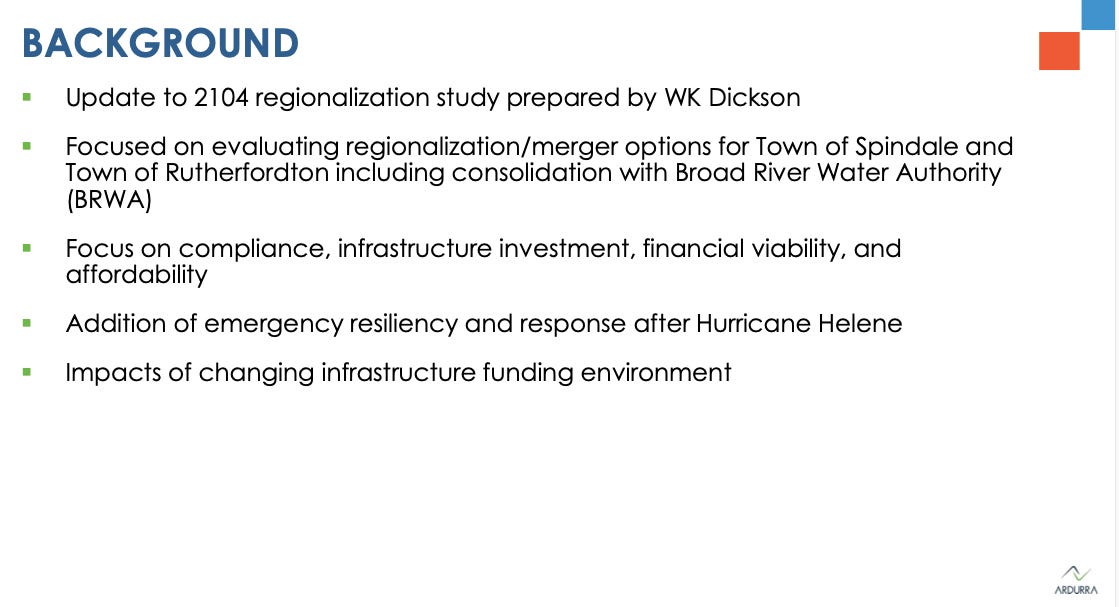This newsletter is supported by readers like you. At Lake Lure News and Cops & Congress, facts come first, followed by clear, thoughtful commentary and original reporting you won’t see anywhere else. Your support keeps local, independent journalism going strong. Your subscription for yourself (or a gift) brings you closer to the decisions shaping the community and ensures I can continue delivering the stories that matter most. Situational awareness: A scoop is exclusive reporting—when no one else is on the story. It’s not just breaking news. It’s journalism with impact.
RUTHERFORDTON, N.C. — At their July 7 meeting, Rutherford County Commissioners charted a forward-looking path on infrastructure consolidation, responded to public concerns about educational and recreational services, and acknowledged the toll of Hurricane Helene on both residents and revenues.
The evening featured a major presentation on regionalizing wastewater utilities, a moving address from Chase Middle School Principal Jennifer McBrayer on the future of local education, and a formal proclamation recognizing the economic development leadership of Terry Hines. Yet amid progress and applause, a few critical points stood out: the Isothermal Community College (ICC) pool has remained closed to the public since May due to a broken motor, and the storm-weary community is still reeling from Hurricane Helene’s impacts.
The meeting also highlighted the county’s decreasing tax collection rate—signaling long-term budget concerns even as officials juggle infrastructure modernization and public needs.
Here are the top 10 takeaways from the meeting, followed by a summary and Cops & Congress commentary on what to watch next.
Top 10 takeaways from the meeting
1. County Eyes Utility Merger for Long-Term Savings
Commissioners reviewed a detailed regionalization study from Ardurra (formerly W.K. Dixon) that could eventually consolidate wastewater services among Spindale, Rutherfordton, and Broad River Water Authority. Consultant Seth Robertson emphasized long-term affordability and emergency preparedness, calling Rutherford’s approach a “success story.”
2. ICC Pool Still Closed, Public Left Waiting
Though not on the formal agenda, the continued closure of the Isothermal Community College swimming pool was quietly acknowledged as a growing concern. The pool has been closed since May due to a broken motor. The facility once hosted community swim programs and served as a vital recreation space. No update was provided on repairs or a reopening timeline.
3. Chase Middle Principal Jennifer McBrayer Calls for Educational Investment
In a heartfelt public comment, Principal McBrayer thanked the board for past support of school resource officers and teacher supplements but pressed leaders to reconsider funding priorities. She questioned why public debate always pits taxpayers against students: “Why must we choose between protecting taxpayers or supporting our children?” she asked. McBrayer also noted the closure of two schools and uncertainty around the continuation of the JAG program (Jobs for America’s Graduates).
4. Hurricane Helene’s Impact Still Being Felt
County Manager Steve Garrison and multiple speakers referenced Hurricane Helene's lasting effects, especially on infrastructure and utilities. Though a final tally wasn't discussed at length, thousands of residents were impacted. Bryan King acknowledged community fatigue from back-to-back challenges, stating plainly, “They’re hurting.”
5. Tax Collection Rate Drops Post-Storm
Commissioners noted a drop in the county’s tax collection rate following the storm. Though no precise percentage was given, several departments are beginning to feel the strain. The combination of storm recovery and a tightening state budget is pushing officials to weigh future cuts carefully.
6. Outdated Address Ordinance Gets a Modern Update
The county’s 1991 road naming and address display ordinance received a long-overdue revision. The new version aligns local rules with North Carolina state building codes and adds a process for changing street numbers when needed—for example, after road realignments like the U.S. 221 bypass.
7. Proclamation Honors Economic Leader Terry Hines
Commissioners honored Terry Hines for more than 17 years of service to the Economic Development Board. Under his leadership, the county saw 481 new jobs announced and major investments. It is not clear how many of those jobs have actually been advertised and filled. Hines downplayed the recognition but was praised by county and economic leaders alike as a stabilizing force during periods of economic uncertainty.
8. Workplace Safety Recognized by State
Three departments received North Carolina Department of Labor safety awards. Public Works and the Tax Revenue office both earned honors, while the Human Resources department celebrated its 21st consecutive year of recognition—underscoring a culture of workplace safety across county government.
9. Board Seats Filled for Library, Tourism, and Education
The board voted unanimously to appoint Pam Mara to the Library Board of Trustees, Amy Jenkins to the Isothermal Community College Board of Trustees, and Debbie Stanfield to the Tourism Development Authority. Willard Whitson was reappointed as TDA chair.
10. Commissioners Prepare for Statewide Conference
Commissioners Michael Benfield and Alan Toney were selected as voting delegate and alternate for the 2025 NC Association of County Commissioners (NCACC) conference in Pitt County this August.
The July 7 meeting offered a clear picture of where Rutherford County is—and where it’s trying to go. Between storm recovery, stalled tax revenue, and aging public infrastructure, county officials are walking a tightrope between modernization and affordability. The updated wastewater study gives them a roadmap, but the public is also watching closely to see whether other vital services—from education to recreation—will keep pace.
Opinion & Analysis: Cops & Congress Commentary
Five Things to Watch
Where Is the ARPA Study?
Rutherford County received $400,000 in federal ARPA funds more than three years ago to study a wastewater utility merger. Yet the full report still hasn’t been released to the public. Instead, commissioners were given a polished presentation—without the data behind it. This isn’t private sector consulting, it is taxpayer-funded government work, and the public deserves to see every page. If the study is finished enough to brief officials, it’s finished enough to publish. It’s essentially an update from 2014 (Read that study I obtained here.) No, Ardurra, it was not done in the year “2104.”
Screenshot from the presentation by Ardurra to Rutherford County Commissioners on July 7, 2025 Broad River’s Quiet Expansion Needs Oversight
Broad River Water Authority is being quietly positioned as the regional sewer provider for much of Rutherford County. But here’s the problem: Broad River has never operated a wastewater system. While legally allowed, the move carries serious implications for rates, accountability, and governance. Before anything is finalized, there should be public meetings, clear agreements, and strong safeguards.The ICC Pool Closure Is a Public Problem
The Isothermal Community College pool has been closed since May due to a broken motor—and no one is providing answers. This isn’t just a campus issue. It affects the public who want to use it across the county. (I nearly signed up for water aerobics but the timing didn’t work for me.) When a public resource disappears, the silence from leadership is unacceptable. The public deserves a repair timeline and a clear plan for reopening.Storm Recovery and Budget Pressure Are Real
Hurricane Helene left a mess—physically and fiscally. The county is now seeing lower tax collection rates, putting pressure on every department. This is no time for vanity projects. Leaders must put essential services first and scrutinize every dollar spent. Federal grants don’t last forever, but their consequences do.ARPA Funds Require Accountability
The ARPA program was designed to accelerate recovery and infrastructure improvements. But when funds are awarded and results are delayed—or hidden—it undermines public trust. The wastewater study isn’t just a case study in government spending; it’s a test of whether transparency still matters in Rutherford County.
📬 Cops & Congress brings you the facts behind the votes and the commentary behind the silence. Subscribe for smart local watchdog journalism out of Western NC.












Share this post